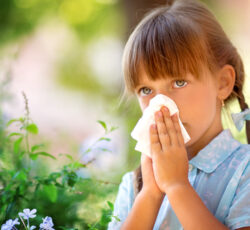
Spring is a beautiful time of year, with flowers blooming, birds chirping, and longer days filled with sunshine. However, for many children, spring also brings allergens that can trigger uncomfortable symptoms like sneezing, coughing, and itchy eyes. As a parent, it can be challenging to see your child suffer from spring allergies, but there are steps you can take to manage their health and alleviate their symptoms.
Understanding Spring Allergies
Before diving into tips for managing your child’s spring allergies, it’s important to understand what causes them in the first place. Spring allergies are usually a result of pollen released from trees, grasses, and weeds. When this pollen is inhaled, it can trigger an allergic reaction in some individuals, leading to symptoms like sneezing, runny nose, itchy eyes, and congestion.
Identify Your Child’s Allergy Triggers
The first step in managing your child’s spring allergies is to identify their specific allergy triggers. This can help you take proactive steps to reduce their exposure to these allergens and prevent symptoms from occurring. Common spring allergens include tree pollen, grass pollen, and mold spores. Your child may also be allergic to certain flowers or plants that are in bloom during the spring months.
Consult with Your Child’s Pediatrician
If you suspect that your child has spring allergies, it’s important to consult with their pediatrician for a proper diagnosis. Your child’s pediatrician can recommend allergy testing to determine their specific triggers and develop a personalized treatment plan. This may include prescription or over-the-counter medications, as well as lifestyle changes to reduce exposure to allergens.
Keep Windows Closed
During the spring months, pollen levels are typically highest in the early morning and evening. To reduce your child’s exposure to allergens, keep windows closed during these times of day, especially in their bedroom. You can also use air conditioning with a HEPA filter to help filter out pollen and other airborne allergens.
Limit Outdoor Activities on High Pollen Days
On days when pollen levels are particularly high, it’s best to limit your child’s outdoor activities to reduce their exposure to allergens. You can check pollen counts in your area using online resources or apps like the American Academy of Allergy, Asthma, and Immunology’s National Allergy Bureau. Consider planning indoor activities or trips to places like museums or libraries on days with high pollen levels.
Encourage Good Hygiene Practices
Encouraging good hygiene practices can help reduce your child’s exposure to allergens and prevent them from spreading to other areas of the home. Have your child wash their hands frequently, especially after playing outdoors or coming in contact with pollen. You can also have them change clothes and shower after spending time outside to remove pollen from their skin and hair.
Invest in Allergy-Friendly Bedding
Since your child spends a significant amount of time in their bedroom, it’s important to create an allergy-friendly environment to help them sleep comfortably. Consider investing in allergen-proof mattress and pillow covers to protect against dust mites, as well as using hypoallergenic bedding and frequent washing of bed linens to reduce allergen exposure.
Maintain a Clean Home
Regular cleaning can help reduce allergens like pollen, dust mites, and pet dander that can trigger your child’s spring allergies. Vacuum carpets, rugs, and upholstery regularly with a HEPA filter vacuum to remove allergens from surfaces. Dust surfaces with a damp cloth to trap allergens instead of spreading them into the air.
Encourage Healthy Habits
In addition to managing your child’s spring allergies, it’s important to encourage healthy habits that can support their overall immune system and well-being. This includes eating a balanced diet with plenty of fruits and vegetables, getting regular exercise, and ensuring they get enough sleep each night. Staying hydrated can also help relieve symptoms like dry throat and nasal congestion.
Monitor Your Child’s Symptoms
Finally, it’s important to closely monitor your child’s symptoms and response to treatment to ensure their spring allergies are well-managed. If your child’s symptoms worsen or do not improve with medication, consult with their pediatrician for further evaluation and possible adjustments to their treatment plan. By staying proactive and vigilant, you can help your child enjoy the beauty of spring without the discomfort of allergies.
Need Childcare Services in Croton-On-Hudson, NY?
At Happy Hearts on the Hudson our goal is to establish an environment rich in self-expression and self-confidence. Where every child learns the importance of responsibility, decision making, and respect for others. We are a family-owned business caring for children from 6 weeks old to 12 years old. Our teachers strive to develop the children’s skills by engaging their hearts as well as their minds. For fun, care, or child education feel free to stop by or give us a call today!
